2023 International Congress on Medieval Studies: Program
January 15, 2023 in Conference, Conference Announcement, International Congress on Medieval Studies
2023 International Congress on Medieval Studies: Program
58th ICMS (11–13 May 2023)
To occur in a transitional ‘hybrid’ form
with Sponsored and Co-Sponsored Sessions
— to be held either in person or online (with some options) —
and with an Open Business Meeting
and Co-Sponsored Reception
[Posted on 17 January 2023, with updates]
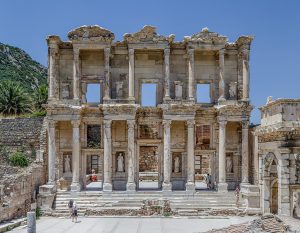
Façade of the Celsus library, in Ephesus, near Selçuk, west Turkey. Photograph (1910): Benh LIEU SONG, via Creative Commons.
Building upon the successful completion of our activities at the 2022 ICMS (see our 2022 International Congress on Medieval Studies Program), we announce our Activities for the 2023 International Congress on Medieval Studies, following our Preparations for them, with the completion of the Call for Papers (15 September 2022) and the selection and submission of the Programs for our Sessions (by 15 October 2022).
For information about the Congress, registration for it, and the current version of the 2023 Congress Program (plus the extra Corrigenda), see the Congress website.
With the turn of the calendar year toward the year of the Congress, we published the selected Programs for our Sessions and announced our other Activities, while we awaited the promulgation of the official Schedule for the 2023 Congress as a whole. With the publication of a Sneek Peak for the Congress Program, we can add the times and venues for our Sessions. As the Congress approaches, new information guides additional features of our planning, with Virtual options now possible for some of our In-Person events, through extra arrangements by the RGME.
This year, with some Sessions on line and some in person in a transitional ICMS, we prepare six Sessions, an Open Business Meeting, and a Reception. Our co-sponsors:
- Societas Magica: 2 Sessions and the Reception
- Schoenberg Institute for Manuscript Studies (SIMS): 2 Sessions
- Polytheism-Oriented Medievalists of North America (P.-O.M.o.N.A.): 1 Session
- Index of Medieval Art at Princeton University: Reception
This year marks Year 19 of our co-sponsorship with the Societas Magica; the second (non-consecutive) year of co-sponsorship with POMONA, the third of co-sponsorship with the Index of Medieval Art, and the first year of co-sponsorship with SIMS.
As always, we thank the host, organizers, co-sponsors, presiders, speakers, respondents, advisers, and participants for our activities at the Congress, along with the Congress staff and support staff.
Here we list our Sessions (arranged in the order in which they are scheduled for the Congress), with the Links to the Abstracts for the individual Papers, then turn to our other Activities (Open Business Meeting and Reception). A Note on our Congress Sessions describes the Indexes of the Abstracts for Papers as published on our website, listed both by Alphabetical order of Author’s Surname and by Year.
Logistics
This year, the partly in-person, virtual, and hybrid modalities to the Congress add to the complexity, tasks, resources, and expenses for preparing for our events there. The complexity encourages us to create more flexible and resourceful our arrangements for some events held in person or virtually, so as to accommodate attendance in these different modalities directed by the Congress, while any fully hybrid event is not permitted for us in the arrangements by this online/offline Congress.
1) Optional RGME Zoom Meeting Room in live time for some In-Person events. For Congress participants unable to travel to the place, but registered for the Congress, we offer an optional Virtual Meeting Room by RGME Zoom subscription. In this way, an In Person Congress event might be accessed virtually — with registration for each of them through our RGME Eventbrite Collection.
We provide the RGME Zoom option (by specific registration, without charge) for
- our In Person Open Business Meeting on Thursday lunchtime and
- our pair of co-sponsored In-Person Sessions on Saturday afternoon.
2) Especially Reserved In-Person Room for In-Person Attendees of the Congress who will log-on to our Virtual Sessions. These reserved rooms are prepared (in different, but adjacent, buildings) for:
- our first, Virtual Session on Thursday morning, with an In-Person option (Session 50 / Schneider 1220)
- the pair of our co-sponsored Virtual Sessions on Thursday afternoon, with In-Person option (Sessions 87 + 137 / Fetzer 1030)The second dedicated room is located a few steps away, on the same floor, in the same building, from the two In-Person events before and after that pair of Sessions, namely the Open Business Meeting and the Reception.
Details below, including information about how to register with us for the access by Zoom for the In-Person events.
In brief:
Day 1 of the Congress (Thursday 11 May) has a full set of events. They open with the Morning Session, lead to the RGME Open Business Meeting (with lunch provided), follow with a pair of Sessions, and round out with the co-hosted Reception.
- Session 50 on “Words as Agents”
held Virtually from 10:00-11:30 am EDT (GMT-4)
— with In-Person option: By arrangement, Schneider 1220 is reserved for us for that time period for those attending the Congress in person, to be able to gather for accessing the online Sessions with their own computers
- RGME Open Business Meeting
held In Person in Fetzer 1035 from 12:00-1:00 pm EDT, with catered lunch (donations are welcome)
— We recommend registering if you plan to attend in person, so that we could know how many to expect.
In Person Reservation for RGME Open Business Meeting
— We also offer the option to attend virtually through the RGME (not via the Congress), for Congress participants unable to travel. With your registration for the event itself, we will send the Zoom link ahead of time.
Virtual Registration Option for RGME Open Business Meeting - Sessions 87 and 137 on “The Eloquence of Medieval Book Bindings”, Parts 1-2
(“Bindings from German Lands” and “Diverse Regional Techniques”)
held Virtually from 1:30-3:00 pm and 3:30-5:00 pm EDT (GMT-4)
— with In-Person option: Fetzer 1030 is reserved for us for the afternoon for those attending the Congress in person, to gather for accessing the online Sessions with their own computers
Update on 7 May: The order of the three Papers in Session 87 is changed from that advertised in the Congress Program Booklet. The Paper by William H. Campbell, formerly in first position, has moved to third, as indicated below. - Co-hosted Reception
held in Person in Fetzer 1035-1045 from 5:30-7:00 pm EDT (GMT-4).
For the RGME Open Business Meeting held In Person, open to to Congress attendees, it would help us to know how many to expect if you would please register for it through the RGME Eventbrite collection. See below.
Day 3 of the Congress (Saturday 13 May) has a pair of Sessions.
- Sessions 369 and 419 on”Moving Parts and Pedagogy”, Parts I–II (“Teaching Magic and Other Occult Arts” and “Teaching Astrology and Other Liberal Arts”)
held In Person in Fetzer 2040 from 1:30-3:00 pm and 3:30-5:00 pm EDT (GMT-4)
(If requested, we will set up an RGME Zoom Room for these Sessions.)
Note: If you have questions about these arrangements, we apologize for the complexity, and ask that you contact director@manuscriptevidence.org. Safe travels!
I: Session Co-Sponsored with Polytheism-Oriented Medievalists of North America (P.-O.M.o.N.A.)
This session is the second (non-consecutive) year of co-sponsorship with this organization. (See 2019 International Congress on Medieval Studies: Report.)
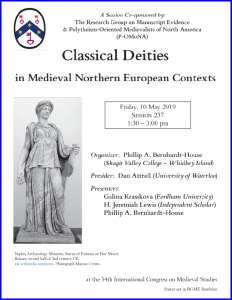
Pomona Session Kzoo 2019
1) “Words as Agents”
Session 50. Thursday 11 May, 10:00 – 11:30 am EDT (Virtual)
(Congress Program, page 19)
Sponsor: Research Group on Manuscript Evidence
Co-sponsor: Polytheism-Oriented Medievalists of North America (P-OMoNA)
Organizer: Phillip Bernhardt-House
Co-Organizer: Mildred Budny
Modality: Online
Aim
The idea of words as agents of specific actions, changes of status, or as means via which changes occur in the wider world is inherent in many forms of literate and verbal communication, underlying human social phenomena as diverse as legal systems, religious community formation and practices, and the practice of magic, amongst others. Textual amulets, deeds, dedicatory inscriptions, and other written matter (even entire alphabets!) can convey notions of words’ agency.
This session explores a variety of these, reflected in specific examples from pre-modern periods and cultures, from the Iron Age to the Renaissance and across wide geographic ranges.
Presider: Michael Allman Conrad (Research Group on Manuscript Evidence)
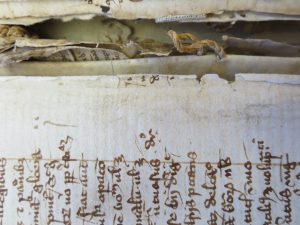
Beinecke Rare Book & Manuscript Library, Otto Ege Collection, Volume II of Ege MS 51, Displaced Folios 29v-26r, View toward Gutter with Reused Manuscript Fragments. Photograph by Mildred Budny.
Presenters
Mildred Budny
“Where Words Collide: Metadata versus Scholarship in Manuscript Studies”
Summary
Metadata for manuscripts can sometimes clash with the original materials, for example by misstatements or mistaken assumptions about features and character of the book. Cases abound with fragments dispersed in Portfolios or Leaf-Books, issued with generic labels copied in library catalogues and WorldCat. We explore examples among Otto Ege fragments. A test-case of sorts concerns recent widespread attention to the 6th-century Gospels of Saint Augustine of Canterbury (Corpus Christi College, Cambridge, MS 286) and the transmission of knowledge or opinions about its characteristics.
Phillip Bernhardt-House (Academic Vagabond)
“The Ephesia Grammata as Grammatical Beings; Or, ‘That Orpheus Is Pretty Good . . . Who’s His Agent?’ ”
Respondent: Linde M. Brocato (University of Miami)
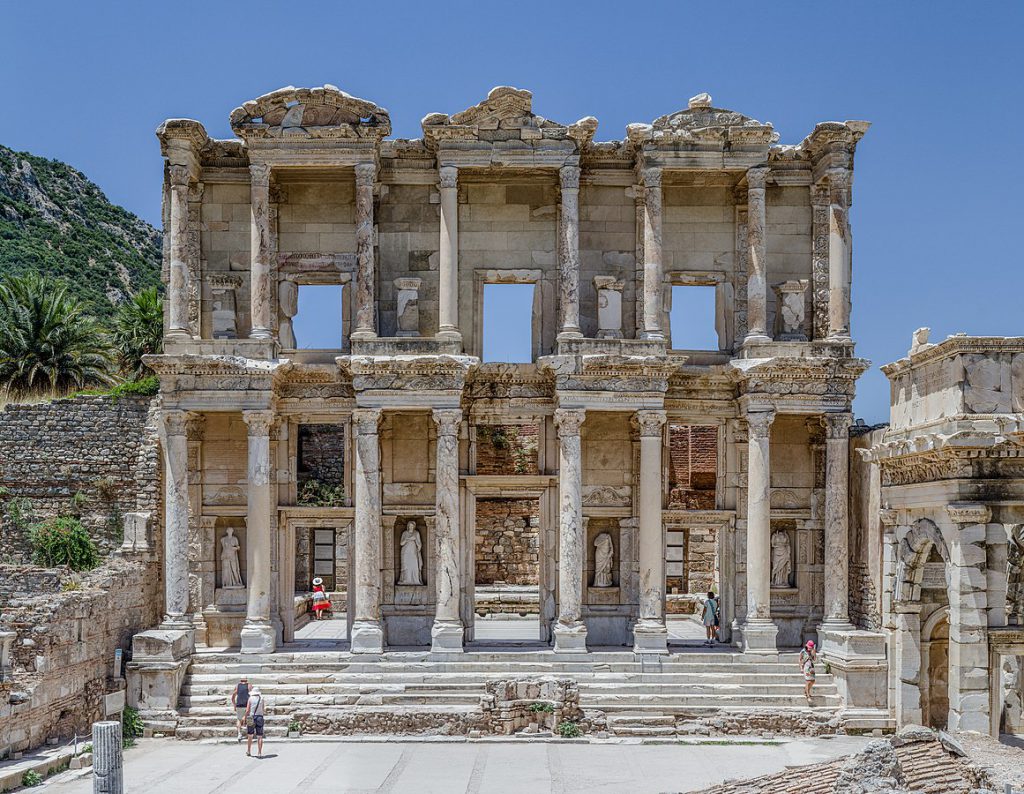
Façade of the Celsus library, in Ephesus, near Selçuk, west Turkey. Photograph (1910): Benh LIEU SONG, via Creative Commons.
RGME Poster for this Session
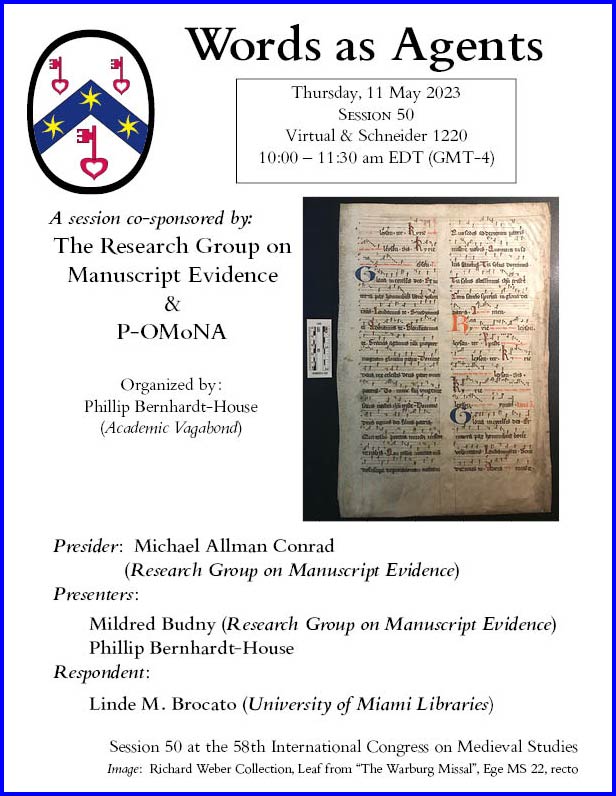
RGME Poster for 2023 Congress Session on “Words as Agents”
*****
[On the day, this Session in Virtual modality in the morning will be followed by the lunchtime RGME Open Business Meeting In Person (see below), which leads to the next Pair of Sessions in Virtual modality, and then the Reception In Person (see below).]
*****
II. Pair of Sessions
Co-Sponsored with the Schoenberg Institute for Manuscript Studies

SIMS Logo
These Sessions represent a new co-sponsorship with the Schoenberg Institute for Manuscript Studies at the Congress.
Responses for the Call for Papers yielded more proposals appropriate for the subject that permission was granted for a pair of Sessions. They are designed to continue the tradition of our series of RGME Sessions at the Congress on “Medieval Writing Materials”, which began in 2014. (See 2022 International Congress on Medieval Studies Program.)
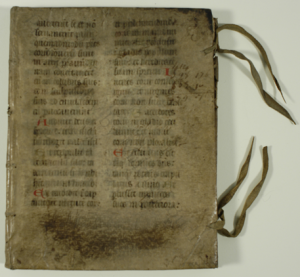
Front cover and ties of French notebook for ‘Recettes’ reusing a vellum bifolium from a medieval Latin Psalter. Photography © Mildred Budny
2–3. “Bound but not Gagged:
The Eloquence of Medieval Book Bindings”
Sessions 87 and 137 on Thursday 11 May: Virtual
Sponsor: Research Group on Manuscript Evidence
Co-sponsor: Schoenberg Institute for Manuscript Studies
Organizer: William H. Campbell (University of Pittsburgh — Greensburg) and
Co-Organizer: Mildred Budny (Research Group on Manuscript Evidence)
Modality: Online (with In-Person Option)
Note: Fetzer Room 1030 has been reserved for our use for these two Virtual Sessions (Congress Sessions 87 and 137), so that Congress participants attending the Congress in person might gather to access them from their own computers.
See the Fetzer Center Floor Plans.
This location could be convenient for those wishing to attend both:
- the RGME Open Business Meeting in from 12:00-1:00 pm EDT in Fetzer 1035 (see below)
and/or - our co-hosted Reception from 5:30-7:00 pm in Fetzer 1035-1045 (see below).
Aim
Medieval books communicate far more than the words on their pages. They were frequently subjected to damage and repair, to loss and addition, to division and recombination. Their bindings bear witness to the moments in their history that altered and shaped them, or — in the case of still older books recycled into binding material — destroyed them. This session is dedicated to everything about the codex that is not its text, to what J. A. Szirmai called The Archaeology of Medieval Bookbinding.
[Note: On the image shown here, see our blog:
Part 1: The Eloquence of Medieval Book Bindings from German Lands
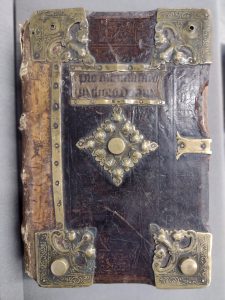
University of Pittsburgh, Special Collections, Office of the Dead (1487), Front Cover. Photography by William H. Campbell.
Session 87. Thursday 11 May, 1:30 – 3:00 pm EDT (Virtual)
(Congress Program, page 32)
[Note: Fetzer Room 1030 has been reserved for our use for these two Virtual Sessions (Congress Sessions 87 and 137), so that Congress participants attending the Congress in person might gather to access them from their own computers.
See the Fetzer Center Floor Plans.
[Note: This location could be convenient for those wishing to attend
- the RGME Open Business Meeting in from 12:00-1:00 pm EDT in Fetzer 1035 (see below) and/or
- our co-hosted Reception from 5:30-7:00 pm in Fetzer 1035-1045 (see below).]
Presider: Mildred Budny (Research Group on Manuscript Evidence)
Presenters
[Update: The sequence has changed from the one formerly announced here and as published in the Congress Booklet, moving the Paper by William H. Campbell from first to third position.]
Michael L. Chrisman (Independent Scholar)
“Early Bindings of the Gutenberg Bible”
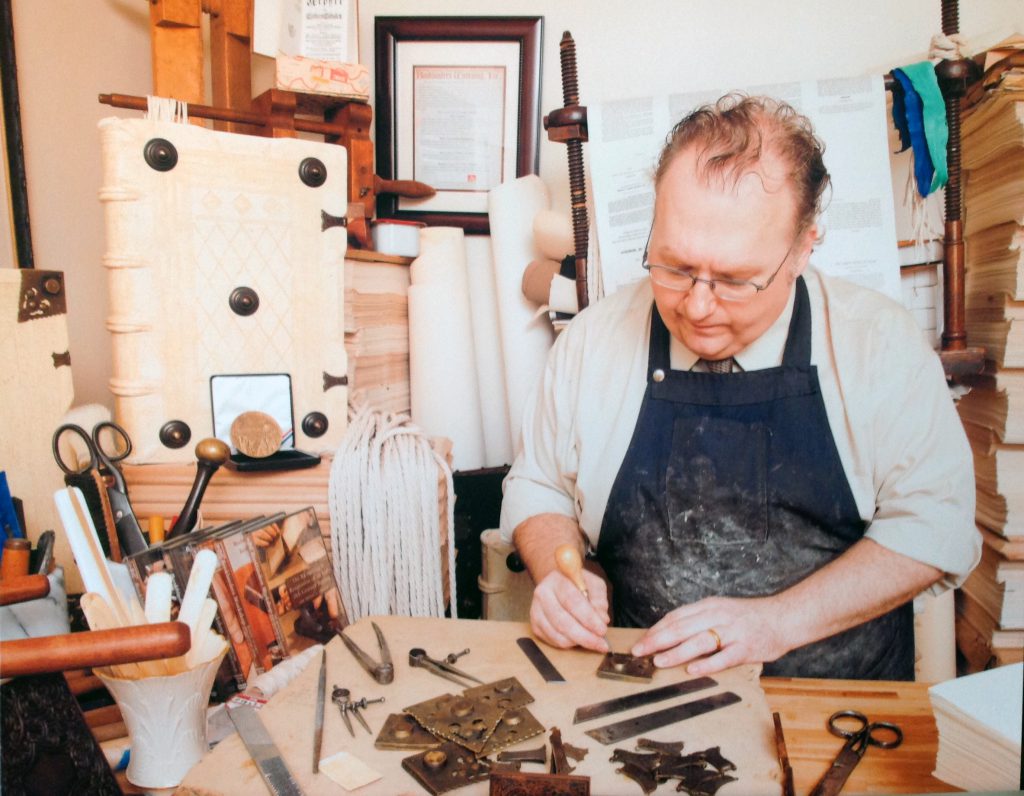
The binder at work. Photography by Michael L. Chrisman, reproduced by permission.
Barbara Williams Ellertson (The BASIRA Project)
“Spines and Fastenings: Binding Archaeology in Works of Art”
Handout. List of References for “Spines and Furniture: Binding Archaeology in Works of Art
William H. Campbell (University of Pittsburgh — Greensburg)
“Recogitabo tibi omnes annos meos: Tracing the Life of an Office of the Dead”
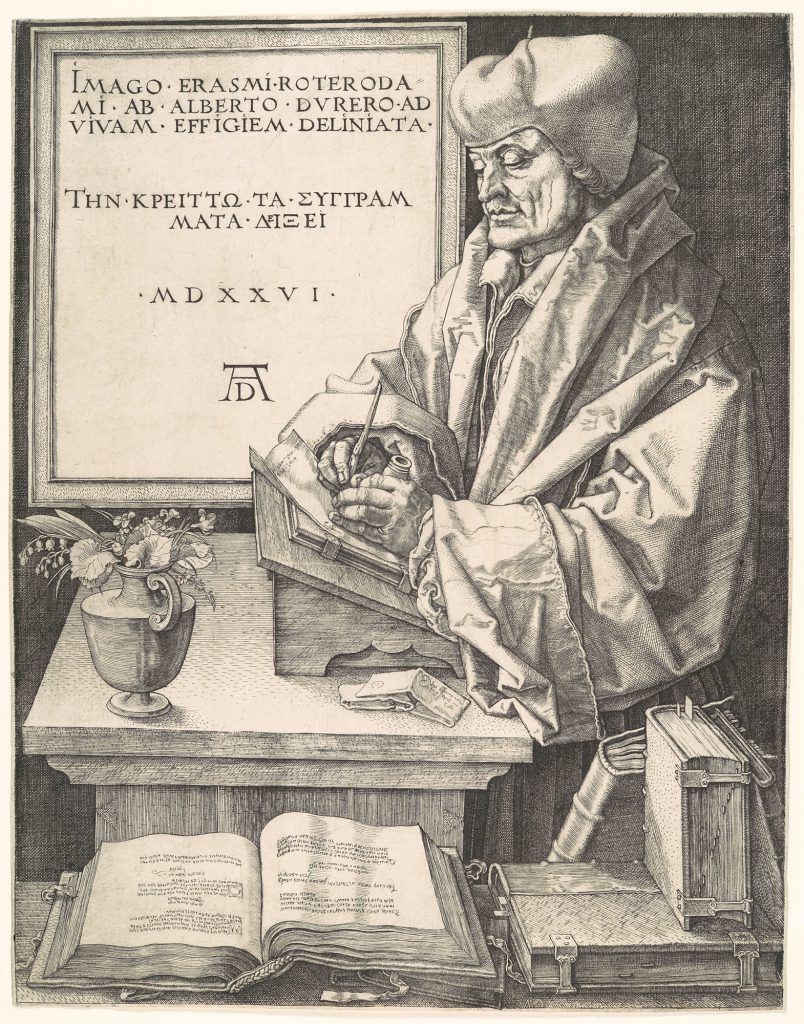
New York, Metropolitan Museum of Art. Albrecht Dürer, Print of copper engraving of “Erasmus of Rotterdam” (1526). Books both opened and closed rest on the writing desk and the ledge in the foreground. Image via Wikimedia and Creative Commons.
RGME Poster for this Session
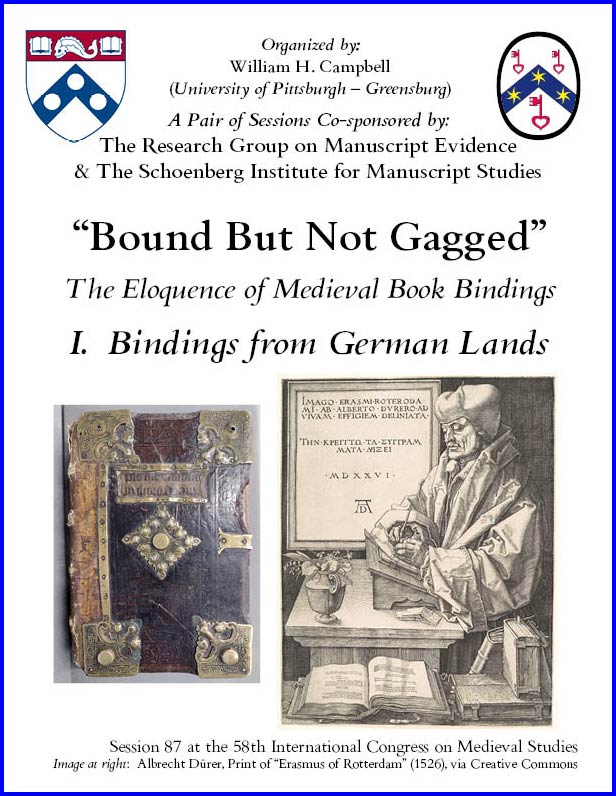
Part 2. The Eloquence of Medieval Book Bindings:
Diverse Regional Techniques
Session 137. Thursday 11 May, 3:30 – 5:00 pm EDT (Virtual)
(Congress Program, page 50)
[Note: Fetzer Room 1030 has been reserved for our use for these two Virtual Sessions, so that Congress participants attending the Congress in person might gather to access them from their own computers. This location is also close to Room 1035-1045, where the co-hosted Reception will take place from 5:30-7:00 pm EDT (GMT-4).
See the Fetzer Center Floor Plans.]
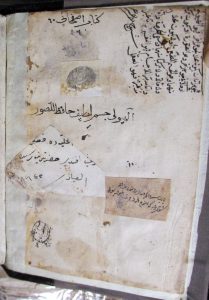
Private Collection. Photography by David Sorenson, reproduced by permission.
Presider: William H. Campbell (University of Pittsburgh — Greensburg)
Presenters
David W. Sorenson (Allen Berman Numismatist)
“Some Medieval Islamic Bookbindings: A Ghost Story”
Eleanor A. Congdon (Youngstown State University)
“Covers of the Account Books in the the Datini Collection: Binding Information Together”
Yukie Baba (Hitotsubashi University and Baba Yukie)
“Curious Quire Signatures Discovered in a Fourteenth-Century Legal Manuscript”
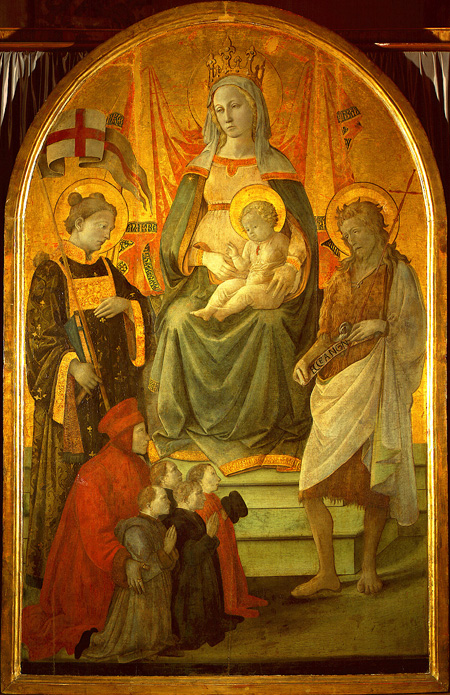
Prato, Civic Museum, Filippo Lippi (circa 1406-1469), Madonna del Ceppo, with Francesco Datini at lower left. Image Public Domain via Wikipedia.
RGME Poster for this Session
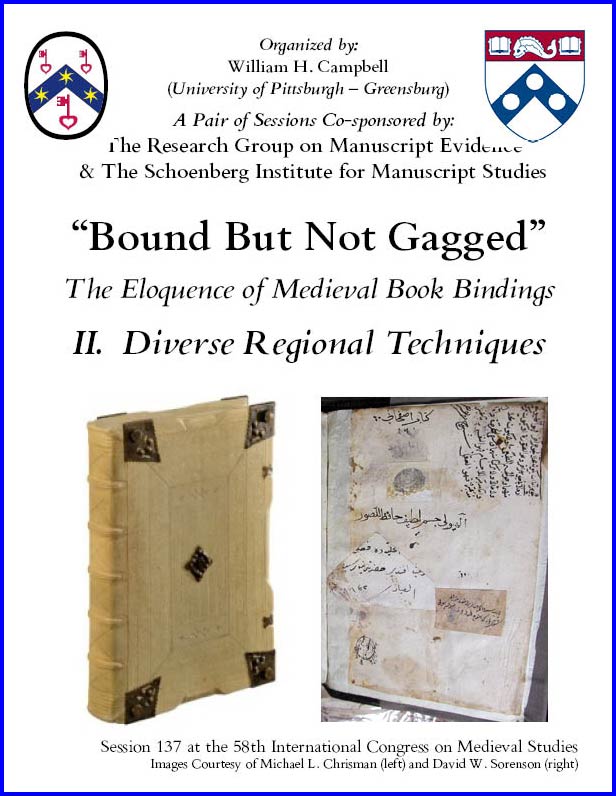
Poster for RGME/SIMS Session 1 of 2 for the 2023 ICMS
*****
III. Sessions Co-Sponsored with the Societas Magica
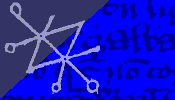
Societas Magica logo
In Year 19 of our Sessions co-sponsored with the Societas Magica, we prepare two Sessions.
4–5. “Moving Parts and Pedagogy, Parts I–II”
Sessions 369 and 419. Saturday 11 May (In person) in Fetzer Center 2040
Sponsor: Societas Magica
Co-Sponsor: Research Group on Manuscript Evidence
Organizer: David Porreca (University of Waterloo)
Modality: In person (with RGME Virtual option)
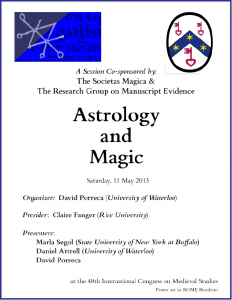
Poster for “Astrology and Magic” Congress Session (7 May 2013)
Part I: “Teaching Magic and Other Occult Arts”
Session 369. Saturday 13 May, 1:30 – 3:00 pm EDT (Fetzer Center 2040)
(Congress Program, page 136)
See the Fetzer Center Floor Plans.
Aim
Magic, alchemy, geomancy, and other occult arts were never part of the official curriculum in any medieval university faculty. Moreover, magical treatises abound in claims of legitimacy in terms of belonging alongside other more overtly recognized sciences. Nevertheless, the abundance of surviving treatises, manuals, and commentaries suggests that there must have been some means outside the bounds of officially recognized institutions for these bodies of knowledge and practices to have been taught, learned, and transmitted, despite the negative light often cast upon them in ‘mainstream’ circles. This session aims to investigate the pedagogy of such arts and practices.
Presider: David Porreca
Presenters
Daniel M. Harms (SUNY Cortland)
” ‘To give myself to be carried immediatly into Hell’:
Weather, Witchcraft, and Two Late Seventeenth-Century Contracts
between a Magician and a Student”
Samuel P. Gillis Hogan (University of Exeter)
“Philosophy is the Child of Contention:
The Accretion of Theory in Instructional Chiromantic and Fairy-Summoning Texts
as a Response to Hostile Criticism”
RGME Poster for this Session
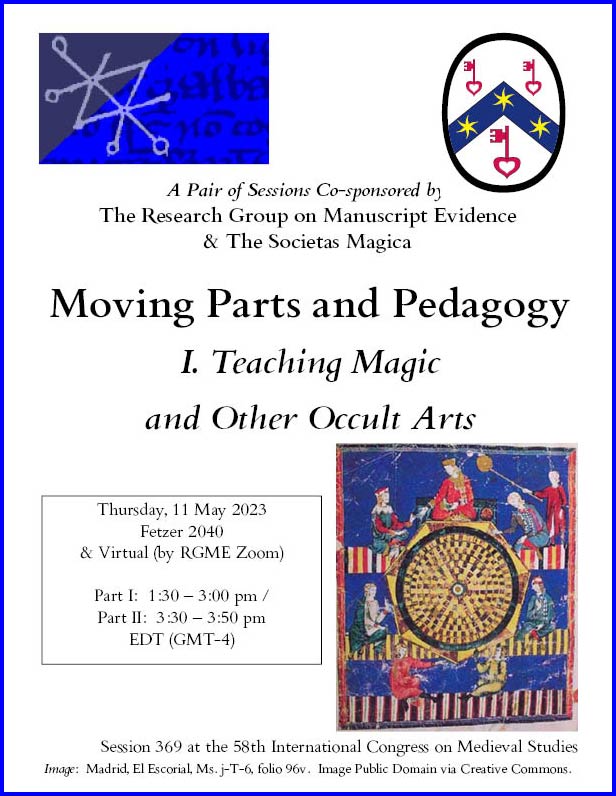
Part II: “Teaching Astrology and Other Liberal Arts”
Session 419. Saturday 11 May, 3:30 – 5:00 pm EDT (Fetzer Center 2040)
(Congress Program, page 154)
See the Fetzer Center Floor Plans.
Aim
During the later Middle Ages, astrology began to play an ever more prominent role in university curricula. It was frequently merged with astronomy as one of the Seven Liberal Arts, and it became required knowledge for the practice of medicine. These developments created a need for new masters capable of rendering its intricacies intelligible to the next generation of doctors and other practitioners. This session aims to examine how the pedagogy of astrology functioned, and how the teaching of that discipline fits alongside the rest of the Liberal Arts curriculum.
Presider: Marla Segol (SUNY University of Buffalo)
Presenters
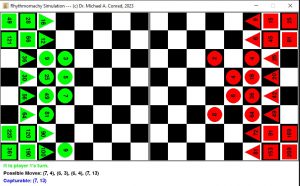
Rhythmomachy Simulation (Player 1’s turn). Image © 2023 Michael A. Conrad.
Michael Allman Conrad (Research Group on Manuscript Evidence)
“Gamified Numbers:
Board Games as Educational Instruments for Teaching Astrology and Other Quadrivial Arts”
Arina Zaytseva (Rice University)
” Ludwig Milich‘s Lutheran Astrology: The Art of the Wise, the Art of the Foolish”
David Porreca (University of Waterloo)
“Games and Pedagogy: William Fulke (1538–1589), Astrology, and Geometry”
Matthew Vanderkwaak (University College Dublin)
“Divine Instruments: The Role of the Heavens in Albert the Great‘s Astrological Cosmos”
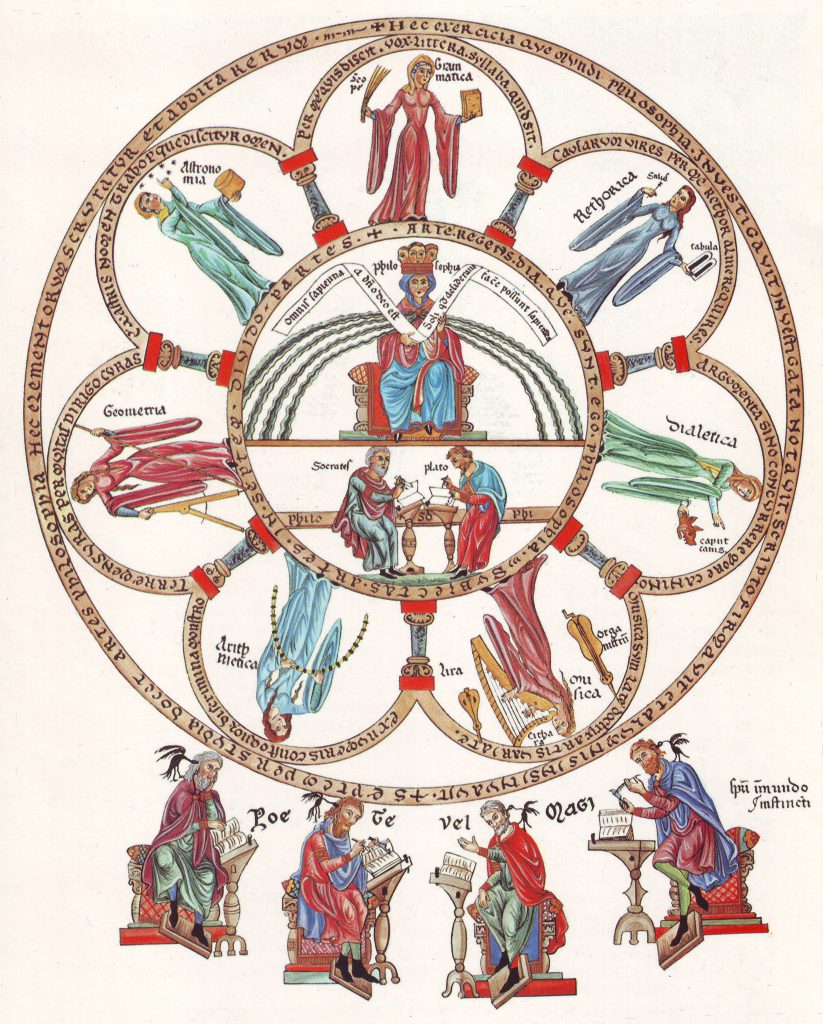
Philosophy and the Seven Liberal Arts personified, as illustrated in a reconstruction of the Hortus deliciarum (“Garden of Delights”) of Herrad of Landsberg (circa 1130 – 1195). Image Public Domain, via Wikipedia.
RGME Poster for this Session
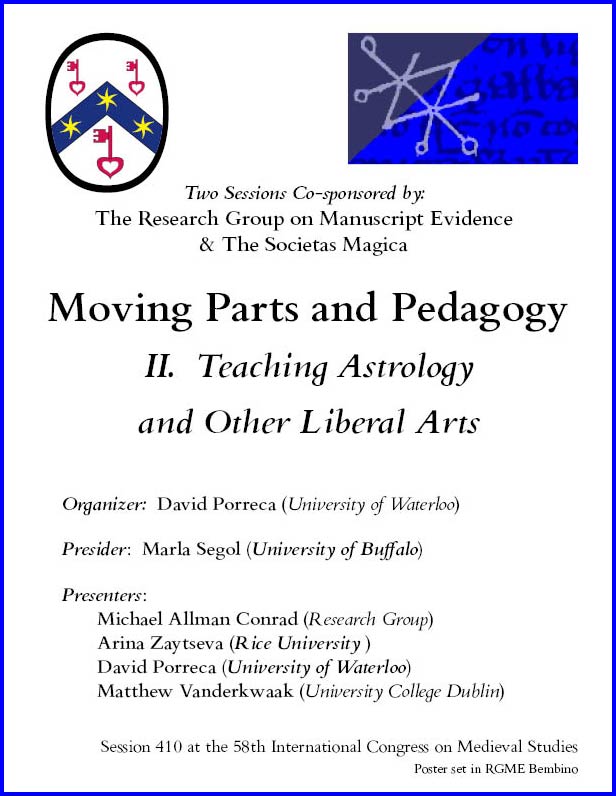
*****
Note on Our 2023 Congress Sessions
The strong responses to the Call for Papers, in a suite of sessions co-sponsored by the Research Group, accord with our many years of participation in the Congress, both in person and online. That tradition is described in our ‘archive’ of Events and Congress Sessions.
- Congress Activities
- Sponsored Sessions at the International Congress on Medieval Studies
- Co-Sponsored Sessions at the International Congress on Medieval Studies
Our tradition includes the publication of Abstracts, as their authors allow, for the Papers and Responses of Sessions sponsored and co-sponsored by the RGME.
You may find individual Abstracts by Name and/or by Year of Presentation in our Lists of
*****
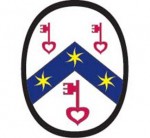 Open Business Meeting
Open Business Meeting
Modality: In Person (with extra RGME Zoom option for Virtual attendance by people registered for the Congress)
Thursday 11 May 2023 from 12:00 to 1:00 pm EDT (GMT-4). Fetzer Center 1035
(Congress Program, page 19)
See the Fetzer Center First Floor Plan.
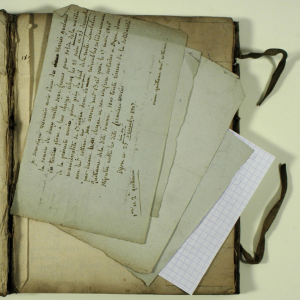
Recettes. Photography by Mildred Budny from a Private Collection.
We resume our tradition of in-person Business Meetings at the Congress, with an Open Business Meeting at lunchtime.
All are welcome. Lunch will be served. We welcome donations to help to cover the costs.
Optional Registration for the Business Meeting, In Person or (through the RGME) Virtual
Registration (optional but helpful) through the RGME Eventbrite Collection
We suggest that, if you plan to attend in person, you register to let us know how many to expect. We offer an optional RGME Zoom meeting room for Congress participants unable to travel.
Both forms of registration have no charge, but donations are welcome for our nonprofit organization and costs.
1. In Person Registration for Business Meeting. Not required for admission, but helpful for our information.
2. Virtual Registration for Business Meeting. We will send the Zoom link after registration by Congress participants wishing to attend virtually.
Business Meeting Agenda and Report
Information (“Handouts” for the Meeting, in 1 page each:
To indicate progress with our plans and activities, you might compare these pages with with last year’s Agenda and Report:
As in 2021 and 2022, the RGME also held an online Pre-Congress Business Meeting within the weeks leading up to the Congress, as a way to prepare for the planning onsite at the Congress. It also gives the opportunity to gather the voices of participants who do not attend the Congress (for example, with interests in other areas) as well as those who do.
See our Business Meetings.
RGME Poster for this Business Meeting
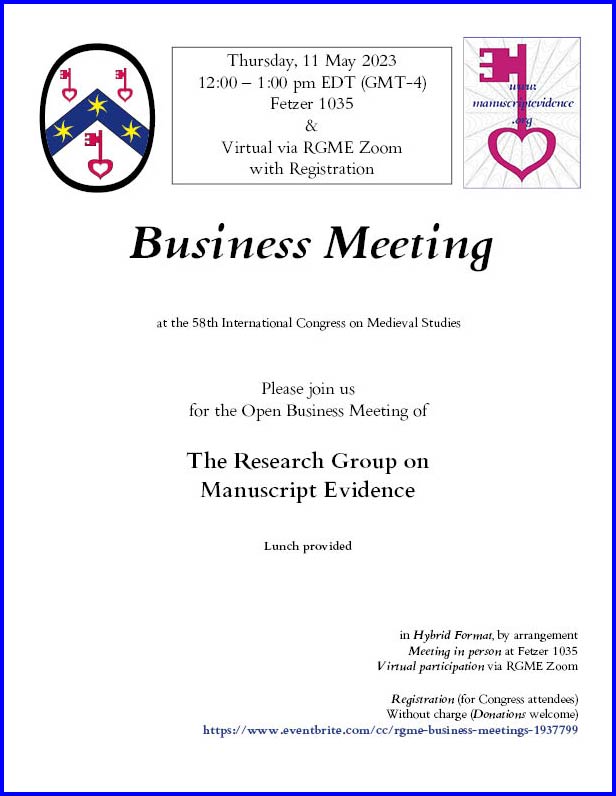
2023 Congress Business Meeting Poster
*****
Reception
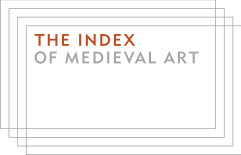 Co-Sponsored by
Co-Sponsored by
Research Group on Manuscript Evidence
Index of Medieval Art at Princeton University
Societas Magica
Modality: In Person
Thursday 11 May 2023 from 5:30 to 7:00 pm EDT (GMT-4). Fetzer Center 1035–1045
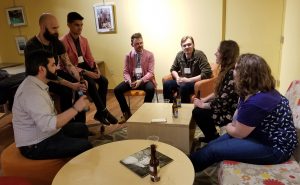
Our co-sponsored Reception at the 2019 Congress. Photography by Mildred Budny.
(Congress Program, page 56)
See the Fetzer Center First Floor Plan.
With the resumption of in-person activities at the ICMS, after the cancelled Congress in 2020 and the fully virtual Congresses in 2021 and 2022, we return to our tradition of a Reception. All are welcome.
This year, as before, we co-sponsor the event with the Societas Magica and the Index of Medieval Art (formerly the Index of Christian Art). These co-sponsorships for our Receptions sometimes occur with one of these organizations (as in 2014), the other (as in 2016), or both of them (as in 2015).
Poster for this Reception
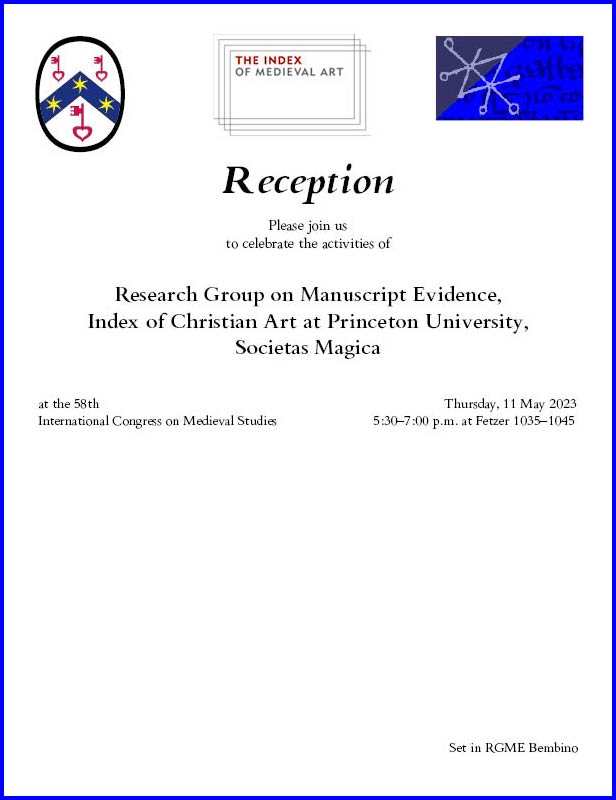
Invitation to the Reception at the 2023 Congress
Memory Lane
2015 Reception
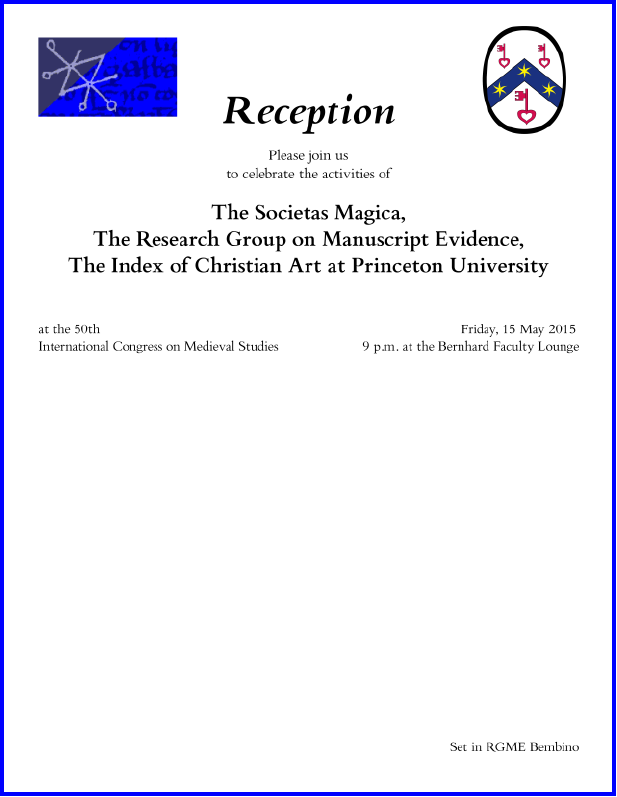
Invitation, set in RGME Bembino, for Reception at the 2015 International Congress on Medieval Studies co-sponsored by the Societas Magica, the Research Group on Manuscript Evidence, and the Index of Christian Art at Princeton University
2016 Reception
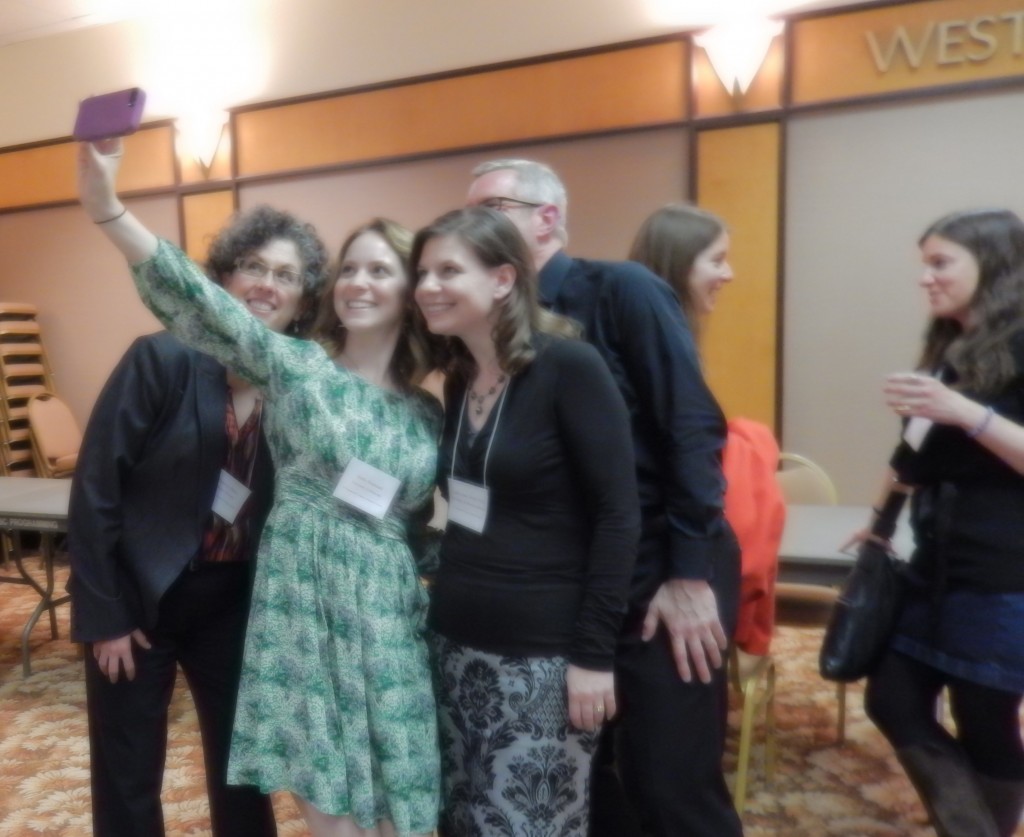
At our co-sponsored Reception at the 2016 Congress. Photograph Mildred Budny.
*****
Watch this space for developments for the 2024 Congress — one of the subjects to consider, for example, at our Open Business Meeting (see above).
*****
Post Script:
The Stories that Bindings Can Tell
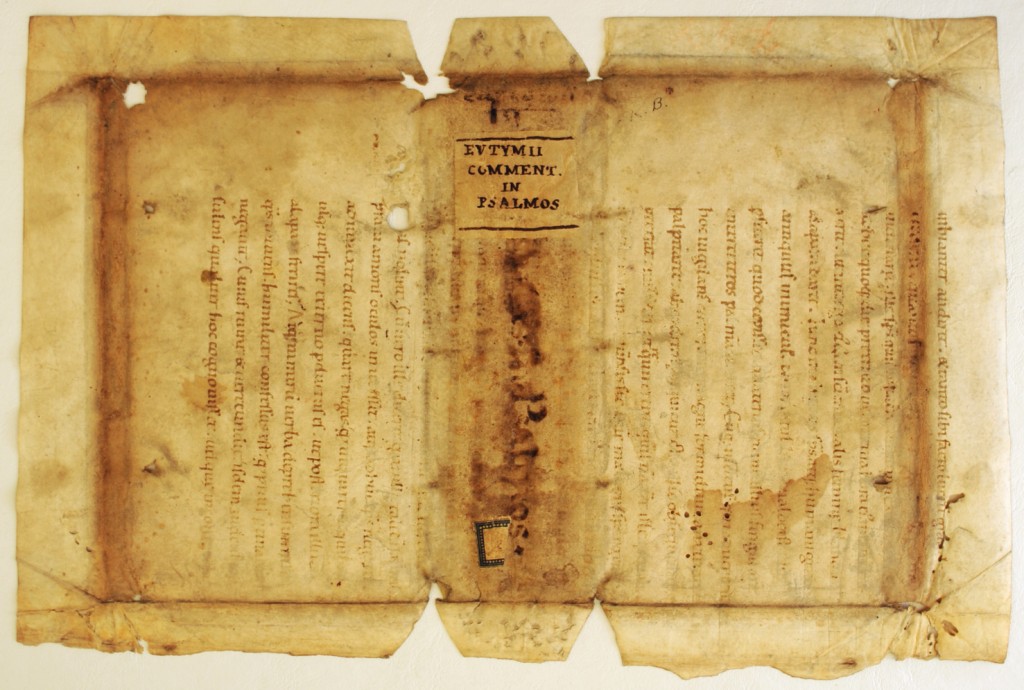
Reused Bifolium, Verso, turned Sideways, as the Cover for a missing volume of Euthymius on the Psalms. Photography Mildred Budny.
[Note: For information about this image, see our blog:
More stories to tell. Watch this space!
*****
